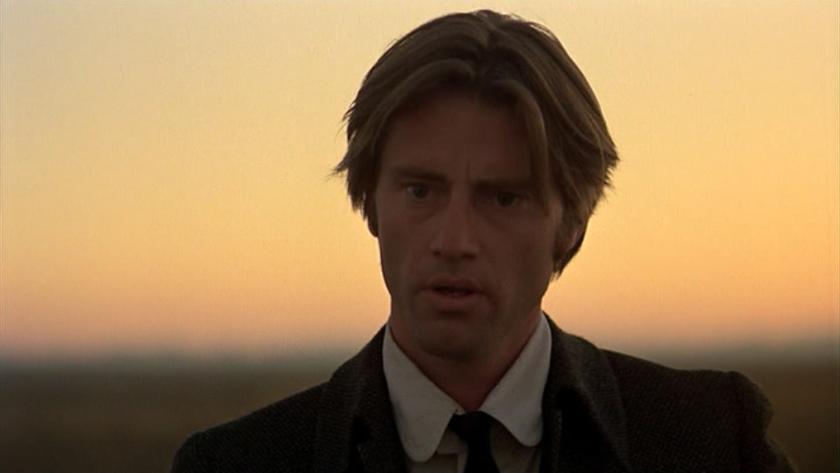Sam Shepard came to live in London in 1971, nursing ambitions to be a rock musician. When he went home three years later, he was soon to be found on the drumstool of Bob Dylan's Rolling Thunder tour. But in between, not long after he arrived in London, he was waylaid by the burgeoning fringe scene, and the rock god project took a back seat. His reputation from the New York underground for courting danger, taking risks, living on the edge etc went before him, and the savage immediacy of his plays found a natural home in the small space houses of the capital.
Outside the inner circle of the fringe, there wasn't much fuss. "I think that London theatre should have got more," remembers Stephen Rea. "The plays came and went with only an acknowledgement by a small group of people. Maybe they weren't aware of quite how important he was. Because he became a movie star, he became a major playwright. But he was a major playwright before that. I think that he did some of his best writing here."
Shepard was already a significant figure when he came to London, the darling of Greenwich Village and an annual collector of Off Broadway Obie awards. Then, at the turn of the decade, he broadened the canvas and wrote a play "that demanded the kind of production only a big theatre could give him," recalls John Lahr, then dramaturge of the Lincoln Center. "So we gave it to him." Operation Sidewinder was Shepard's first foray into what Lahr calls the "enemy camp" of uptown. He brought his experimental band, the Holy Modal Rounders, with him. But his new audience wasn't ready. "We lost about 10,000 subscribers," says Lahr.
Like so many other American playwrights, in other words, what first brought him to an environment less scornful of flops was a critical handbagging back home. No wonder Rea, for whom Shepard would later write the plays Kicking a Dead Horse (2007) and Ages of the Moon (2009), speaks of those years as a period "of reassembling himself. My sense was that he was in recovery from something. We began to mooch around together. He didn't drink at that time and I drank quite a lot so the mooching was of a very particular kind."
Nicholas Wright, then artistic director of the Theatre Upstairs, recalls "a laconic, dry, very laid back, very masculine Gary Cooperish kind of style, certainly very direct, capable of being quite rude." "My impression," says the actress Dinah Stabb, "was that he was always keenly interested in events going on outside the room. Although he was part of the world of the Royal Court, he never seemed to be of it. It's no surprise that he went on to be a film star, because he seemed like a film star when you met him. People always wanted to be part of him, to be where he was."
Sam just let you do it. There was no directorial ego going on
The Royal Court's nascent Theatre Upstairs was among the first theatres to get its fix of Shepard. Its third ever production, in 1969, was La Turista. The King's Head took up the baton with Chicago, Red Cross and The Holy Ghostly, all lunchtime one-acters in which Shepard had no direct involvement. Charles Marowitz premiered The Tooth of Crime at the Open Space, a qualified success starring Richard O'Brien as a young pretender ousting a reigning rock monarch. In The Unseen Hand they hauled a 1956 Chevrolet onto the tiny stage of the Theatre Upstairs, a stunt which impressed more than it had in Operation Sidewinder.
But from this distance it looks as if London was missing its opportunity, and it's possible that Shepard sensed it himself when he asked Wright if he could direct a play commissioned from him by the Court. Geography of a Horse Dreamer was an exercise in submerged autobiography about a man called Cody kidnapped by betting racketeers because his dreams predict horserace winners. His powers shrink as he dreams dog winners, then mutates into a dog himself. (In London Shepard couldn't indulge his obsession with horses, but he co-owned a greyhound, wishfully named Crazy Horse, and raced it at White City and Haringey).
The cast of Rea, Bob Hoskins and Kenneth Cranham, who went down the dogs with their director, was augmented by a non-actor cast solely on account of his vast bulk. "It made enormous demands on Sam," recalls Wright, "that he had to coach this elderly guy through a speech that he showed no signs of ever getting to know, and Sam was terribly patient. At that point I thought, you really are taking this very seriously."
In rehearsals, contrary to convention, they ran straight through the play from very early on. "There was no messing about," says Rea. "Sam just let you do it. There was no directorial ego going on. All the actors shelved their ego because they knew it wouldn't wash." The shame is that this (in retrospect) landmark production ran to studio audiences for only three weeks. But at least the play enjoyed an afterlife. Little Ocean, a short play about pregnancy, ran very briefly late at night a month later at the Hampstead Theatre (the author's local, who lived just off the Heath), and has barely been seen since.
"He wrote it about three women," recalls Dinah Stabb: "his wife O-Lan, who'd had a baby; me, who was about to have a baby, and Caroline [Hutchinson, Rea's then girlfriend], who hadn't had a baby. Because I was seven months' pregnant I couldn't really do anything, and O-Lan couldn't really work in this country. One day, he said, 'I'll write something for you.' So we all held our breath, crossed our fingers, and waited. It was extraordinary: it was written by a man, but it didn't feel like that. There's a beautiful speech at the end about what it feels like to give birth, about feeling like a big animal" (a distinctly Shepardian trope). At Shepard's suggestion, Rea directed, because "it seemed part of the nature of him writing the play for these women that it should be done by someone who was around."
Shepard himself wasn't around for much longer. Nancy Meckler, a director he instinctively trusted, staged Action at the Theatre Upstairs that September, and Rea was in that too. And then, aged 30, he left. "He's an American," says Rea. "He had to be close to his source. At the end of Geography of a Horse Dreamer they put on the Cajun music, and he has to be back with that. The cowboys burst in and say, `We've come for our brother.' Cody feels creatively constricted by his environment: that's why he has to burst out and go home."
Sam Shepard, 1943-2017















Add comment